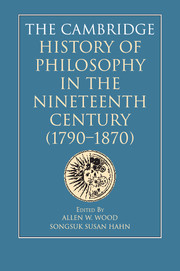Preface
Published online by Cambridge University Press: 05 December 2012
Summary
Preface
Like the other volumes of the Cambridge History of Philosophy, this one attempts to provide a comprehensive account of philosophy during the period it covers, focusing on the European philosophical tradition. But it both begins earlier and ends earlier than the title “Nineteenth Century” would suggest. The starting point is 1790, which roughly coincides with the rise of post-Kantian philosophy in Germany and reactions to the French Revolution throughout Europe. It ends about 1870, well before the end of the nineteenth century proper. In this respect, the period covered, and especially its terminus ad quem, has been chosen to coordinate with the Cambridge History of Philosophy series as a whole. The volume covers the period in which movements such as German idealism, Young Hegelianism, Marxism, Darwinism, positivism, utilitarianism, and Scottish common sense philosophy characterized the philosophical landscape. This volume does not try to cover a number of figures and movements that began in the late nineteenth century and carried over into the twentieth – such as Husserl, Mach, pragmatism, British idealism, and both Marburg and Southwest German neo-Kantianism.
The present volume, therefore, might be thought of as the history of early and middle nineteenth-century philosophy. Yet wherever authors of individual articles felt they must go further in order to complete the story they think needs to be told, they have been encouraged to do so. Also, we take responsibility for covering the thought of Friedrich Nietzsche (1844–1900), because it is hard to conceive of a treatment of nineteenth-century philosophy that would exclude his reflections on such important topics of nineteenth-century philosophy as art, morality, and history.
- Type
- Chapter
- Information
- Publisher: Cambridge University PressPrint publication year: 2012

